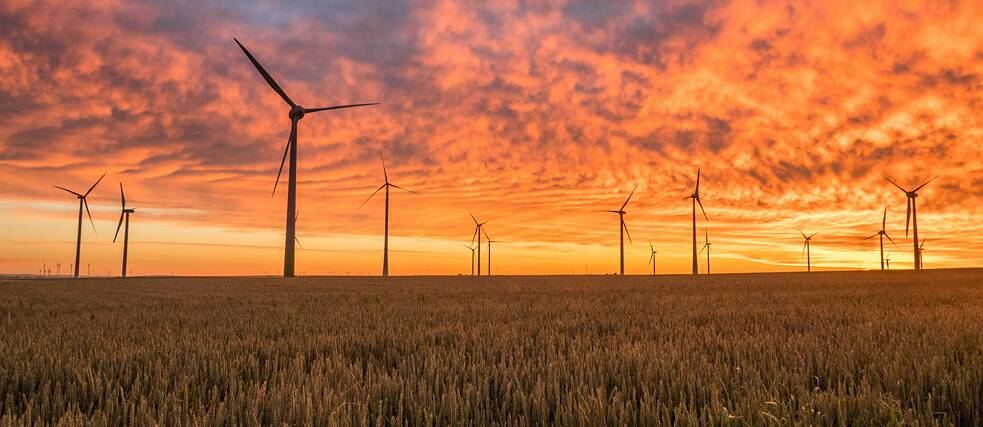Our Way of Life is Unsustainable
The economic competitiveness is one of the main causes of the deepening climate crisis. Despite this knowledge, global capitalism still forces us to constantly accumulate capital and expand. This way of our existence is environmentally and economically unsustainable. In our survey of the month, we approached experts from our partner countries with two questions on the topic of sustainability:

Survey: Our Way of Life is Unsustainable | Photo: Key Visual 'Survey: Our Way of Life is Unsustainable' © Karsten Würth on Unsplash
Ukraine
MARIANA VERBOVSKA is an environmental and climate change journalist. She is the author of the Toolkit How to write on Climate Change in Ukraine.- When discussing sustainability, it's crucial to consider its three pillars: social, environmental, and economic. Thus, the economic aspect is an essential requirement if we aim to maintain harmony on our planet. A sustainable approach is increasingly viewed not as a luxury but as a necessity – investing in programs supporting a healthier environment leads to an extended lifespan. The climate crisis reveals the disproportionate impacts of climate change on low-income countries and communities worldwide, highlighting that a solely capitalist approach focused on innovation and prosperity can severely damage our planet. This realization has led to an increasing number of businesses prioritizing and addressing environmental concerns.
- The European Green Deal comprises a set of policy initiatives intended to guide the EU toward a greener transition. A deeper understanding of this document in conjunction with the specific needs of one's country or community would make the discussion more relevant. Effective communication of this policy's importance depends on the context of its application. For instance, in a country like Ukraine, emphasizing the “From Farm to Fork” chapter becomes crucial. This section aims to create fair, healthy, and environmentally-friendly food systems—an essential consideration for Ukraine, where 57% of the land is arable, and agriculture constitutes a significant part of the national industry.
Slovakia
RICHARD SŤAHEL is a senior researcher at the Institute of Philosophy of the Slovak Academy of Sciences in Bratislava, where he holds the position of director of institute and the head of the Department of Environmental Philosophy. He specializes in environmental and political philosophy and the philosophy of human rights.He focuses on examining the causes of global industrial civilization crisis and the philosophical, social, and political consequences of climate change and the mass extinction of plant and animal species. He pays special attention to the philosophical aspects of Anthropocene, ecological civilization, and environmental democracy concepts.
- The drive for economic competitiveness is one of the main causes of the deepening climate crisis. Climate, environmental and social policies are largely sacrificed in an attempt to achieve or at least maintain a certain level of competitiveness. Competitiveness discourse commonly identifies measures aimed at reducing the carbon or overall environmental footprint of production and consumption as obstacles and constraints to business and the growth of living standards, which increase costs and thus reduce competitiveness. Moreover, the principle of competition makes cooperation difficult or even impossible and, at the very least, undermines the principle of solidarity. However, it is the integration of the principles of cooperation and solidarity into public policies as well as personal value settings that is a prerequisite for climate sustainability. The principle of sustainability and the principle of competitiveness are based on different value systems or worldviews that are practically mutually exclusive. The principle of sustainability is based on the knowledge of the finitude and vulnerability of the planetary system as a fundamental prerequisite not only for any human activity but also for the existence of organized human society (civilization) and for the life of man as a species. The principle of competitiveness is based on the imperative of growth (production, consumption, profit, population) and as such ignores the knowledge of the earth sciences and, ultimately, the basic laws of nature. Thus, this question is important because it allows thematizing and then comparing the different paradigmatic frameworks that underlie the concepts of (climate) sustainability and (economic) competitiveness.
- Linking the objectives of the Green Deal to the concepts of competitiveness and growth, albeit green, is inherently contradictory. Any growth is linked not only to continued growth in the consumption of renewable and non-renewable resources, but also to further growth in greenhouse gas emissions and other forms of pollution. Following the record rise in the average temperature of the atmosphere and the world's oceans in 2023 and the simultaneous return to coal burning as the primary energy source in Europe's largest economy, the targets set by the European agreement and the methods of achieving them are in apparent conflict with socio-environmental reality. Nor does it add to the credibility of the European Green Deal that it effectively ignores the increase in greenhouse gas emissions from arms production and the increase in all kinds of military activities in Europe. For the ordinary European citizen, this agreement will become interesting when public transport, especially rail transport, is actually more accessible, that is to say, when not only local but also trans-European rail transport is not only more reliable than air or car transport, but also cheaper. This means that we need to move as quickly as possible from the promises of carbon pricing for air transport to their implementation, as well as the redirection of direct and indirect subsidies from the fossil fuel industry and related sectors (e.g., private aviation and maritime transport) to the electrification and modernization of Europe's rail network.
Poland
KACPER SZULECKI is a professor at the Norwegian Institute of Foreign Affairs and the University of Oslo, and a member of the editorial board of Kultura Liberalna. His main research interests are energy, climate and environmental politics, dissent and protest as well as intra-European migration.- To some extent climate mitigation can be achieved with technological progress, and this also means that there are payoffs for businesses and industries. Green modernization is an appealing vision because it allows us to envisage economic growth as something compatible with ambitious climate action. However, we need to bear in mind that maintaining the current economic system intact will most likely not be possible if we treat the climate challenge seriously. There are limits to how far market-based instruments and technological innovation can take us in mitigating climate change without a serious revision of the way we think about the economy. We need to bear this in mind, and we should be wary of voices that suggest either that climate action will be economically beneficial for everyone – they most often mean themselves – but also of those who say that we should think of competitiveness or economic development first and saving the climate only later.
- At the moment, the EGD is portrayed as a bureaucratic mastodon or an attack on long established ways of life. The Deal is the most ambitious sustainability policy package ever created, but to make it more appealing, we might need to emphasize that apart from environmental goals and beyond industrial policy underpinnings, it is ultimately about something that could be captured by three Ws: welfare, wellness and wellbeing. It is an attempt to turn Europe into a cleaner, more modern, and more liveable place for its citizens. These dimensions seem to be lost in much of EU communication and media reporting.
Slovakia
PETER DAUBNER is a political scientist, political philosopher, and political economist.- Short answer: No. In the system of global capitalism, the imperatives of competitiveness, growth, flexibility and profit maximization are elevated to the axiomatic basis of policies at the national and global level. The UN conferences about climate change that have taken place over the past 30 years clearly show the absolute unwillingness of the political and economic elites to stop the course leading to climate collapse. Despite these conferences, agreements, treaties and legislative measures, global greenhouse gas emissions are increasing every year. Planet Earth is under threat. Just like humanity as a biological species. An important factor that affects the sustainability of the climate system of the planet Earth is the concentration of CO2 in the atmosphere. It has already exceeded 420 ppm and is constantly rising. At the same time, only 10% of the richest people on the planet produce about 52% of the world's CO2 emissions, and the poorer half of humanity only 7%. The core of the current global climate crisis is therefore the failure of the political and economic structures of the current global civilization. The global climate crisis is unprecedented and probably irreversible. Global climate change represents the greatest global threat to ecosystems and thus to human life and future generations. Efforts aimed at limiting these changes are chronically insufficient. The need to address the global climate crisis requires us to keep fossil resource reserves underground and begin the transition to a 21st century economy based on renewable energy sources.
- The European Green Deal is the European Union's strategy aimed at achieving climate neutrality by 2050, which is a commitment resulting from the Paris Agreement adopted in 2015. However, despite this global agreement, global greenhouse gas emissions are rising unstoppably every year. Therefore, the obligations are not fulfilled. The year 2023 was the warmest year in the history of measurements. I personally doubt that it is even possible to achieve net zero emissions in the European Union by 2050 solely through the implementation of legislation based on the “green growth” paradigm and thus prevent a global climate catastrophe. The European Green Deal is not a sufficient strategy. And she's not even “sexy” per se. It's the minimum. Global climate changes are the most visible reminder of the unsustainability of the model of exponential economic growth and of humanity's destructive life strategy towards nature. Our way of life is unsustainable. Global civilization must collectively engage in socio-ecological transformation, radically change production relations and consumer norms of behavior, change its life strategy; in such a way as to create a path to the stabilization of the climate system and thus also to the sustainable development of global civilization. If humanity as a biological species is to survive, the current “capitalist civilization” fully committed to the single-minded pursuit of short-term profit must inevitably retreat and move toward an “ecological civilization.”
Hungary
ERIK PAXIAN is a wildlife engineer and biological soil resources management engineer. Specialising in horticulture, permaculture, horticultural and agro-ecological systems.- As the almost clichéd Native American saying goes: “When you have cut down the last tree, poisoned the last river and caught the last fish, you will realize that money is not edible.” Without the flow of money, there is no economy, and today's globalised modern society could not exist in this form. I think the opening quote sums up the point well. Do we have to stay in competition? Yes! At all costs? No!
The human race is what it is today because of the natural resources that surround it. Human learning is a wonderful thing. We have learnt to build walls from rock, to make steel from minerals, to produce plastics in laboratories and to create what is perhaps the most amazing invention of mankind, the World Wide Web, not to mention artificial intelligence. But one thing we haven't yet mastered is how to use our natural resources properly, and that is the key to our future.
Call it climate change, call it soil degradation, call it a drastic loss of biodiversity, but we are really talking about one thing – our future. The dynamics of the economy and what is happening in it today cannot be called sustainable. Since the main concern of economic operators is to make as much profit as possible, new products are also created primarily with the aim of making a profit, rather than with the aim of genuine sustainability. True sustainability would require a reform of the internal dynamics of the market economy and finally a recognition that our priceless natural resources have intrinsic value and are not subordinated to economic competition.
Czech Republic
PETR DOUBRAVSKÝ is a student, ecological and left-wing activist and one of the initiators and spokesmen of student climate strikes in the Czech Republic.- Considering the global perspective, I find this imperative. We find ourselves in a reality of escalated and tense relations between global powers. Yet cooperation to solve environmental crises and shared responsibility for shared ecosystems is inevitable, even in the midst of global competition for power. Limited alternatives exist.
More narrowly, I think we need to emphasise cooperation rather than competition. If we want our economy to be more respectful of ecosystems, nature and people, we need much more cooperation than competition. Establishing local relationships and fostering cooperation between producers and consumers of various kinds is impossible without collaboration. Of course, competition is unavoidable, with collaboration forming the most human of needs. However, the reality is that the current market competition, driven by the pursuit of the highest profit at the lowest cost, is grounded in deteriorating ecosystems and a society on the decline.
- It is essential for the Green Deal to focus more on people and their needs. Unfortunately, money often ends up in the hands of major players rather than addressing the genuine needs of the people, as exemplified in cases like Just Transition.
I really feel sometimes that the West does not understand our context and we do not have leaders who can explain it or promote solutions that will work here. Instead, we listen to hysterical screeching and horror scares. We need to bring the real needs of ordinary people into the debate – to talk about the vital role of public services, whether it's education or health. And not least about the future of work. To navigate the economic modernization smoothly, we must envision the outcomes, ensuring improved jobs, conditions, and lives.
Lithuania
ALFREDAS SKINULIS is a founder and director of the Environmental Institute in Vilnius.- There are many examples of why sustainable, climate-friendly business solutions are already more cost-effective than unsustainable ones. Sustainable business practices lower the cost of capital for businesses, improve productivity and increase shareholder value, and make products more affordable.
Sustainability is an additional opportunity for business to meet today's challenges. And it pays to be sustainable at every step of the way.
A successful business is not built in a day. Sustainability that pays is also not a one-day job. It is a long-term process, and sustainable solutions must be integrated into every step of a company's operations. In fact, a professionally developed and consistently implemented sustainability strategy delivers good results in the first year.
The previous misconception that sustainability is only about the environment is disappearing. More and more businesses are realising that true sustainability is based on three areas – social, governance and the aforementioned environmental.
What are the key strengths of sustainable business? A sustainable company is able to ensure long-term financial success and create attractive jobs that are highly socially responsible. But sustainable businesses do not only create value for themselves, they also support the well-being of their communities and contribute to the long-term sustainability of the planet by reducing the environmental impact of their operations and introducing innovative solutions.
Surveys show that 69% of jobseekers are concerned about whether their future employer operates sustainably. So, implementing a sustainability strategy can make a company more attractive on the job market.
Sustainable companies are more profitable, innovative, and resilient to change, which is why investors are increasingly turning to these companies for new opportunities. An EY survey showed that 74% of investors are reluctant to invest in companies with a questionable sustainability strategy, and as many as 90% of investors are more focused on sustainability in their decision-making.
It has already been shown that companies that implement sustainable solutions see higher productivity, loyalty and even 55% better employee well-being.
By implementing sustainability measures, a business can see positive changes in almost every area of its operations: competitive advantage, image, a more loyal team, and increased company value. To make this work, it is essential to develop a sustainability strategy that works for you and to integrate sustainability into every step of your business.
Czech Republic
MARTIN ABEL is a lawyer and analyst who focuses on decarbonization of the economy, especially the energy sector.He also devoted analytical work to biofuels and hydrogen. Currently, he is working on the definition of so-called acceleration areas for the accelerated development of renewable resources in the Czech Republic and related changes in legislation and spatial planning.
- The notion of some fundamental friction between competitiveness and sustainability is widespread, but misguided. The costs of climate inaction include losses of infrastructure, environmental migration, and social unrest – hardly a good environment for competitive business. I think most businesses are aware of that. In fact, many of them design more sustainable business models capable of driving companies which rely on conventional technologies out of business. Less energy, less materials, happier employees. Such is the way of capitalism. You either innovate or die. The European Commission literally insists on its webpage that the Green Deal economy will be “modern, resource-efficient and competitive”. The last few years have shown that the execution of this vision will require not only special tariffs on imported goods (CBAM) but also government support of key industries, substantial reskilling, and other protective measures. Not because other continents don’t invest in sustainable technologies, but because they do, and with significant state support as well. I implied earlier that overall competitiveness requires overall sustainability. You could say it works the other way around, too. To pay for the green investments, we need European businesses to succeed on the international market. It is time we embraced sustainability as an opportunity.
Lithuania
ŽIVILĖ MANTRIMAITĖ (Lithuania) is a climate justice activist and researcher. Her research and advocacy topics include energy poverty, energy democracy and ownership, renewable energy policies and air pollution.- Economic competitiveness for economic growth has been seen as a solution to ending poverty and inequality. Nevertheless, with the impending ecological crisis, decreasing global living standards and rising unemployment, economic growth, which is based on the extraction of materials and fossil fuels, fails to acknowledge that we live on a planet with finite resources. As reported by the Economic World Forum, currently the world’s population consumes as much natural resources as 1.7 earths can provide. Yet, we do not have more than one earth. And here we face the difficult question: should we halt economic competition to ensure a sustainable future for all?
The conventional economic growth model based on GDP (gross domestic product) is hardly compatible with climate sustainability. As shown by research, increase in GDP leads to more intense resource and energy use. Recognising that resource consumption cannot be decoupled from the economic growth, the European Environmental Agency has advocated for alternative solutions to the current economic model and the European Parliament hosted several conferences focusing on new post-growth economic systems. Several new models have emerged including degrowth strategy and doughnut economics, aiming to evaluate success of the economy not on growth, but on the well-being of humans and the planet. These emerging new models, based on solidarity, rather than competitiveness must be considered if we are serious about not trespassing the planetary boundaries and stopping grievous impacts of climate change.
- Firstly, it is important to note that the European Green deal is not adequate to deal with the climate crisis, and there are still several “holes” within the social and environmental regulation, which have to be fixed. Yet, the debut of the European Green deal has already brought heated polarised discussions across the EU countries. Two weeks ago, in Lithuania we saw large protests of farmers. Such protests are rising in other countries too and they are partly or fully directed at the regulation laid out within the deal. The confusion around the actual problems of the EU agricultural policies, created a vacuum that was easily filled with misinformation against environmental regulation. But in reality, with drought, fires and depleting biodiversity there is no good future in farming.
The communication about the European Green deal should prioritise different values and needs of people and communities. Rather than using explicitly political or technological language, it should focus on telling a story about how environmental protection relates to our lives, how reducing air and water pollution impacts our health, how energy communities can help to deal with unreasonable energy bills, and how reducing land degradation can help to produce our daily food, while dealing with carbon emissions.













